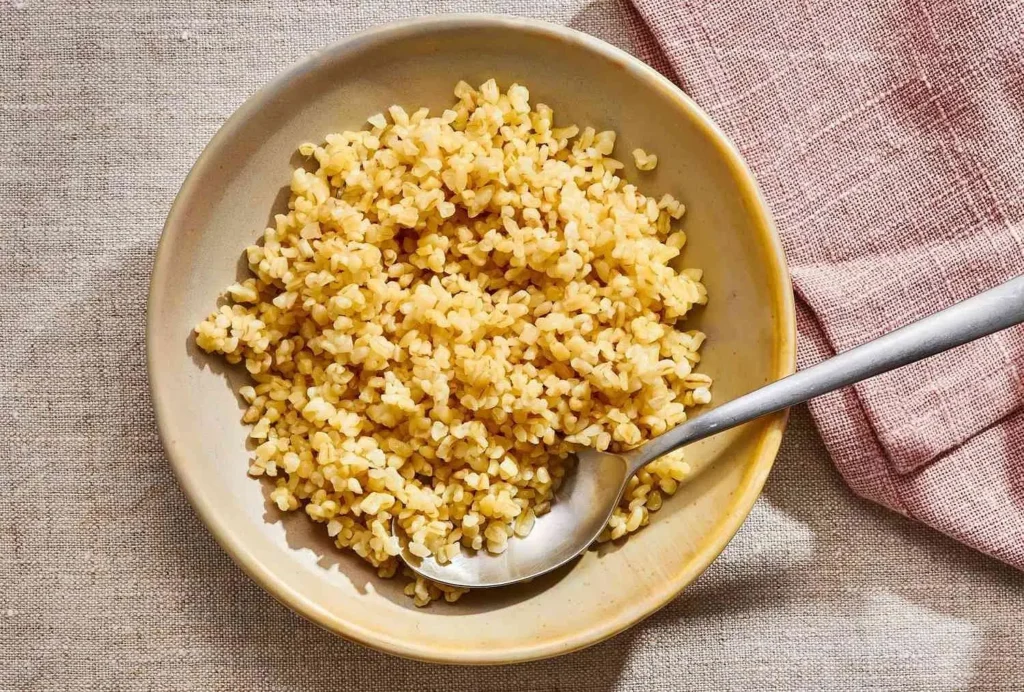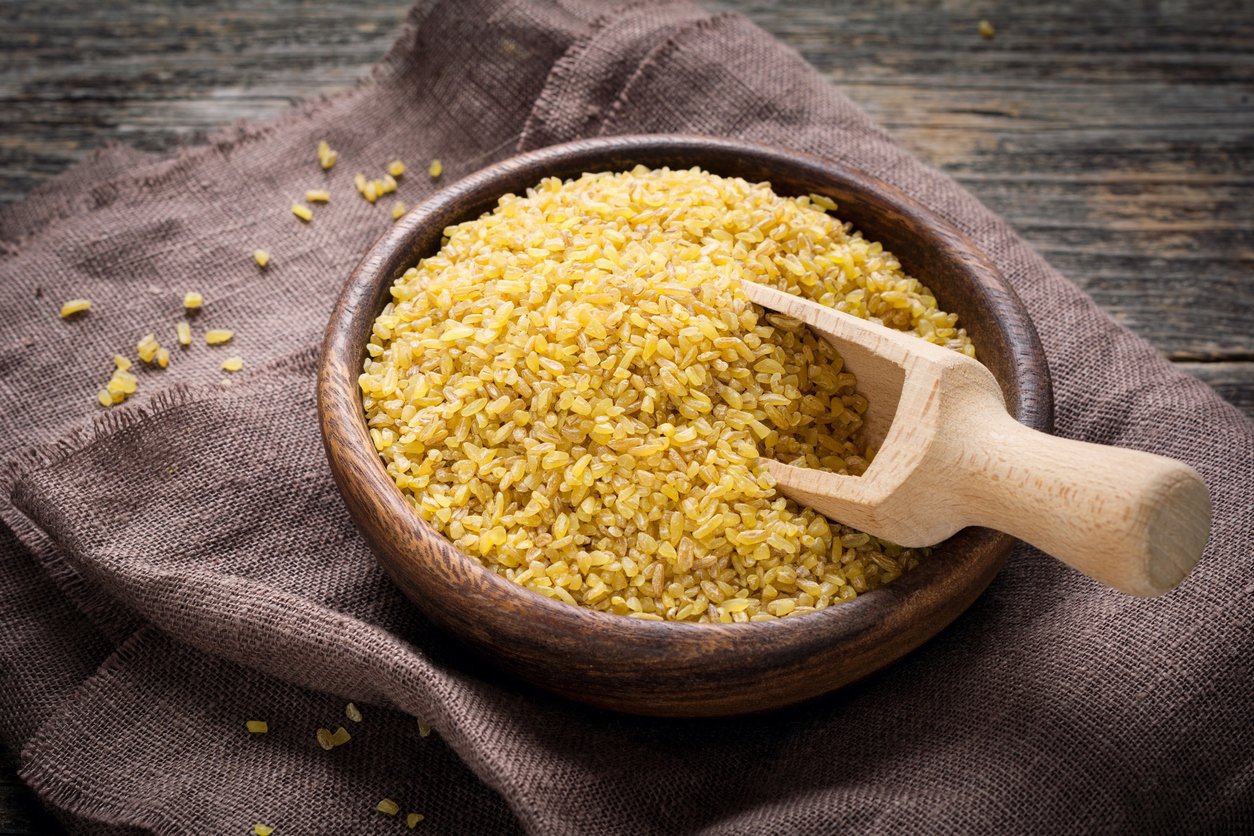In the world of whole grains, bulgur often flies under the radar, overshadowed by trendy superfoods like quinoa and farro. But this ancient grain, a staple in Middle Eastern and Mediterranean cuisines, deserves a spot in your pantry. Packed with nutrients, versatile in the kitchen, and quick to prepare, bulgur is a powerhouse of health benefits. Whether you’re looking to boost your fiber intake, add more plant-based protein to your diet, or simply explore new flavors, bulgur is a grain worth getting to know.
Let’s dive into its benefits, properties, and potential contraindications.
What is Bulgur?
Bulgur is a whole grain made from cracked and parboiled wheat kernels, most commonly durum wheat. It has a nutty flavor and a chewy texture, making it a versatile ingredient in salads, pilafs, soups, and even desserts. Unlike many other grains, bulgur is pre-cooked, which means it requires minimal preparation—just a quick soak or simmer, and it’s ready to eat.
Nutritional Profile of Bulgur
Bulgur is a nutrient-dense food, offering a wide range of vitamins, minerals, and other beneficial compounds. Here’s a breakdown of its nutritional properties per 1 cup (182 grams) of cooked bulgur:
- Calories: 151
- Protein: 5.6 grams
- Carbohydrates: 33.8 grams
- Fiber: 8.2 grams
- Fat: 0.4 grams
- Iron: 1.7 mg (10% of the Daily Value)
- Magnesium: 58 mg (15% of the Daily Value)
- B Vitamins: Including folate, which is essential for cell growth and metabolism.
Health Benefits of Bulgur
- Rich in Fiber
Bulgur is an excellent source of dietary fiber, which supports digestive health, prevents constipation, and promotes a healthy gut microbiome. The high fiber content also helps you feel full longer, making it a great addition to weight management plans. - Supports Heart Health
The fiber in bulgur helps lower LDL (bad) cholesterol levels, reducing the risk of heart disease. Additionally, its magnesium content supports healthy blood pressure and overall cardiovascular function. - Balances Blood Sugar Levels
Bulgur has a low glycemic index, meaning it releases sugar slowly into the bloodstream. This makes it a great choice for people with diabetes or those looking to maintain stable energy levels throughout the day. - Promotes Weight Management
With its high fiber and protein content, bulgur helps keep you satiated, reducing the likelihood of overeating. Its low calorie count also makes it a weight-friendly food. - Provides Plant-Based Protein
Bulgur is a good source of plant-based protein, making it a valuable addition to vegetarian and vegan diets. Pair it with legumes or nuts for a complete protein meal. - Rich in Antioxidants
Bulgur contains antioxidants like phenolic compounds, which help combat oxidative stress and reduce inflammation in the body. - Supports Bone Health
The magnesium and phosphorus in bulgur contribute to strong bones and teeth, making it a great choice for maintaining bone density as you age.
How to Use Bulgur in Your Kitchen
Bulgur’s mild, nutty flavor and quick cooking time make it a versatile ingredient. Here are some ideas for incorporating it into your meals:
- Salads: Use bulgur as a base for grain salads like tabbouleh, adding fresh herbs, vegetables, and a zesty dressing.
- Pilafs: Sauté bulgur with onions, garlic, and spices, then simmer with broth for a flavorful side dish.
- Soups and Stews: Add bulgur to soups and stews for extra texture and nutrition.
- Breakfast Bowls: Mix cooked bulgur with yogurt, fruits, and nuts for a hearty breakfast.
- Stuffing: Use bulgur as a stuffing for vegetables like bell peppers or zucchini.
Potential Contraindications and Precautions
While bulgur is a healthy and nutritious food for most people, there are a few considerations to keep in mind:
- Gluten Intolerance or Celiac Disease
Bulgur is made from wheat and contains gluten, making it unsuitable for individuals with celiac disease or gluten sensitivity. For a gluten-free alternative, consider quinoa or millet. - High Fiber Content
While fiber is beneficial, consuming too much too quickly can cause digestive discomfort, such as bloating or gas. If you’re new to high-fiber foods, introduce bulgur gradually and drink plenty of water. - Phytic Acid Content
Like many whole grains, bulgur contains phytic acid, which can inhibit the absorption of certain minerals like iron and zinc. Soaking or fermenting bulgur can help reduce its phytic acid content. - Allergies
Although rare, some individuals may have a wheat allergy. If you experience symptoms like itching, swelling, or difficulty breathing after consuming bulgur, seek medical attention.

Bulgur is a nutrient-packed, versatile, and easy-to-prepare grain that offers a wide range of health benefits. From supporting heart health and digestion to providing plant-based protein and antioxidants, it’s a wholesome addition to any diet. Whether you’re making a refreshing tabbouleh salad, a hearty pilaf, or a comforting soup, bulgur’s nutty flavor and chewy texture are sure to delight your taste buds.
So, the next time you’re looking for a healthy and delicious grain to add to your meals, give bulgur a try. It’s a simple way to nourish your body while exploring the rich culinary traditions of the Mediterranean and Middle East.
Happy cooking! 🌾🍴

